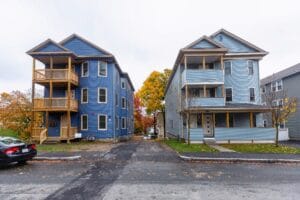
Developer Civico is modernizing 19th-century housing stock to appeal to the “missing middle” market segment for young professionals in Worcester. Photo courtesy of Civico
Triple-deckers have been part of the landscape in Massachusetts’ industrial cities for more than a century, providing workforce housing for generations of immigrants, working-class families and off-campus student renters.
In Worcester, Civico Development has combined in-house architectural savvy with sustainability strategies to reposition nearly 90 triple-decker units in the Bell Hill neighborhood near UMass Medical School for the growing professional and graduate student demographic. But unlike the condo conversions that have been widespread in Greater Boston, Civico is managing the portfolio with a buy-and-hold strategy as rentals, a reflection of the relatively low housing prices in Worcester and demand for rentals in the “missing middle” rent tier.
“We identified a huge need for middle-market housing,” said Taylor Bearden, a partner at Civico. “Historically, the triple-decker is extremely stable in terms of demand. There’s always going to be a market.”
$7M in Private Equity
Andrew Consigli, an architect-turned-developer whose older brothers run the Milford-based family construction business, founded Civico in 2015 to design sustainable multifamily projects outside Boston. Bearden, a Clark University graduate with a background in development and property management, and a Worcester environmental consulting firm formed a partnership with Consigli to redesign triple-deckers for 21st century living patterns and energy efficiency.
The firm raised $7 million for a private equity fund to acquire dozens of multifamily properties in Bell Hill, where triple-deckers were recently available for as little as $250,000. An internal construction division knocked down walls to create open floor plans, added eat-in kitchens and converted underutilized porch space into master bedrooms with private baths.
“There’s an influx of residents who are willing to pay more in rent, but didn’t have many housing options to choose from,” said Bearden, who said completed units have been renting for approximately $1,800. “If you’re a medical school student from the Midwest, your expectations of an apartment are hard to find, so we’re turning them into the standards of today.”
Acknowledging that displacement of existing tenants is a byproduct of the process, Beardon said the company plans to own the properties for up to 18 years and will contribute to neighborhood stability and better upkeep than smaller landlords typically provide.

Civico has purchased and renovated nearly 90 units of multifamily housing in Worcester’s Bell Hill neighborhood, adding new energy-efficient heating systems and updating interiors to match designs typically seen in new construction. Photo courtesy of Civico
Energy Savings Passed to Tenants
Energy retrofits are a key element of Civico’s business plan and the $300,000 it spends on upgrades to the typical property. A partnership with Sustainable Comfort, a Worcester-based energy consultant, addressed the drawbacks of triple-deckers’ original designs such as aging systems and balloon frame construction with minimal insulation.
“They’re notorious energy hogs. People who live in them all have a story about getting an $800 heating bill in January,” said Albert LaValley, president of Sustainable Comfort.
Some triple-deckers still have “gas on gas” heating systems that rely on stove-type heating elements in the kitchen and living room, electric baseboard heating or a boiler that serves all three floors. Civico typically installs mini-split heat and cooling pumps serving individual units, with utility bills paid by tenants.
“If we can cut $3,000 from their utility bill and we charge them $2,000 more in rent, everybody still wins in that scenario,” LaValley said.
Price Growth Forces Adaptation
Civico’s business plan to own and operate the properties as rentals takes place amid lingering softness in Worcester’s for-sale condominium market dating back to the previous decade, said Andrew Howarth, director of development for nonprofit Worcester Community Housing Resources. Median condo prices bottomed out at $85,500 in 2011, according to data compiled by The Warren Group, publisher of Banker & Tradesman, and rebounded to $185,800 during the first seven months of 2020.
The low entry point for multifamily properties compared with parts of eastern Massachusetts has attracted investors who didn’t anticipate the high operating costs of aging triple-deckers as rentals, Howarth said.

Steve Adams
“Some of these chickens are coming home to roost in terms of big requirements for capital investment in heating, plumbing and electric system upgrades,” he said.
Civico, by contrast, is investing in capital upgrades and reaping higher rents in return.
“Their return on investment is going to be better than people who bought bargain basement three-deckers and were not able to rent them for what they thought they could because of the utility situation,” said Howorth, whose organization’s services include loans to landlords for energy system replacements.
While Civico’s Bell Hill Opportunity Fund has been fully deployed, it’s planning a different model for future projects. As triple-decker prices have risen over the past three years, the market no longer offers the low acquisition costs that enabled it to invest in renovations and made the Bell Hill portfolio financial model a success, Consigli said.
“Three years ago, we were flying under the radar and prices were a little bit lower. It’s harder now and we’ve got to go into different neighborhoods,” he said.
After it completes updating its final five units, Civico is partnering with the East Side Community Development Corp. and Seven Hills Foundation on a proposed 20-unit tiny house village development on Lagrange Street for formerly homeless individuals.




 |
| 

